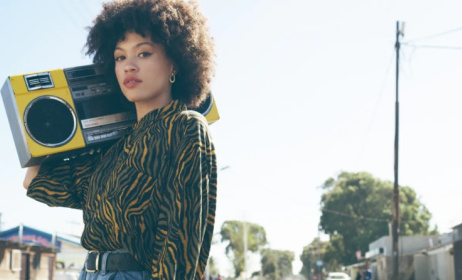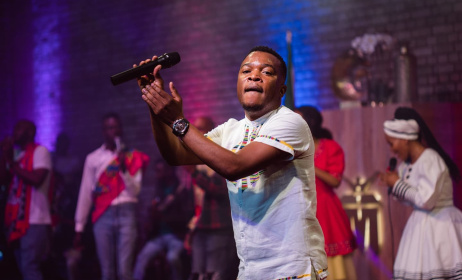Local content quotas increased for SA radio – but is it enough?
Following an ongoing battle over local music being ignored by broadcasters in favour of American music, South Africa’s broadcasting regulator has ordered an increase in the local music quota for public and commercial radio stations.
 Don Laka says the amended quotas are still not enough. Photo: hypeavenue.com
Don Laka says the amended quotas are still not enough. Photo: hypeavenue.com
This comes after legendary jazz musician and producer Don Laka two months ago renewed his decades-long fight with local radio stations over their lack of local content on the airwaves.
Announcing the change in quotas in late March, the Independent Communications Authority of South Africa (ICASA) said: “A holder of a public sound-broadcasting service licence must ensure that after 18 months from the date of gazetting of these regulations, a minimum of 60% of the musical works broadcast in the performance period consist of South African music.”
With regards to commercial stations, ICASA stated: “A minimum of 35% of the musical works broadcast in the performance period must consist of South African music.”
The penalty for non-compliance is a fine “not exceeding” R5 million or 10% of the licensee’s annual turnover “for every day or part thereof during which the contravention continued,” added ICASA.
The previous quotas were 40% for community stations and 25% for commercial stations.
The amended quotas fall short, however, of the 70% quota that some advocates were pushing for – and it will be implemented gradually rather than immediately.
According to the article in the Government Gazette of 23 March, ICASA recommends that “this quota be implemented in stages as this will ensure that the audiences do not experience a sudden change in their experience of the radio station.”
The article notes that South African Broadcasting Corporation (SABC), which runs most of the country’s radio stations, “is of the view that increases of the local music quota should be based on music research with the public, thereby ensuring that radio stations respond to listener needs. The SABC was of the view that 70% is high and will lead to loss of audiences. This proposed quota will hinder the growth of the public broadcaster.”
Lukewarm response from artists
The change seems to be inspired by the furore caused by Laka when he began posting statements on social media expressing his concerns, also speaking on the subject to the mainstream media. But Laka himself is not happy with the recent amendment, saying the revised quotas are still not good enough.
In an article published in the Cape Times recently, Laka said: “The biggest stumbling block and oppressor of our music not to be played is ICASA with its unpatriotic behaviour, by regulating in favour of foreign music,” he said, adding: “We have sufficient content in all the genres to commit to a 100% quota.”
Local singer-songwriter Nakhane Toure (who featured on Black Coffee’s massive hit ‘We Dance Again’) told The Star: “I guess I’m happy this has been brought to life, but I feel like we’re still crawling. And now there’s no excuse because they can’t say local music isn’t as good as international music. I don’t think it’s something to celebrate, but it’s good that we’re starting somewhere.”
Taking to his own social media after the announcement, Laka did not pull any punches, calling ICASA “the devil” and accusing them of “declaring war on our culture”, perpetuating “the continued impoverishment of our artists” and preferring “a lost youth who don't know who they are” by “refusing the advancement of our music and culture on radio and TV”.
Laka accused ICASA of “shooting down” the efforts of musicians and the government’s Department of Arts and Culture and the Department of Trade and Industry to enforce a higher quota of 60% for commercial stations, saying 35% was still insufficient.
Laka also accused the SABC of refusing to call for higher quotas. Both ICASA and the SABC, he said, had “betrayed” the country’s music community, and he threatened to take the matter to the Equality Court and even the Constitutional Court. “We must fight and seek intervention,” he wrote.
“It’s a big shame on the government institutions advocating the destruction of its own culture,” added Laka, calling them “heartless people looking to enrich the already rich."
Proof of the growing disenchantment towards the country’s rulers, Minister of Arts and Culture Nathi Mthethwa was booed off stage when he tried to address the audience at the recent Cape Town International Jazz Festival during a performance by Mafikizolo.
The issue of American music dominating African airwaves is of course not unique to South Africa. In recent years similar protests have erupted in other African countries such as Kenya and Gambia.



































Comments
Log in or register to post comments